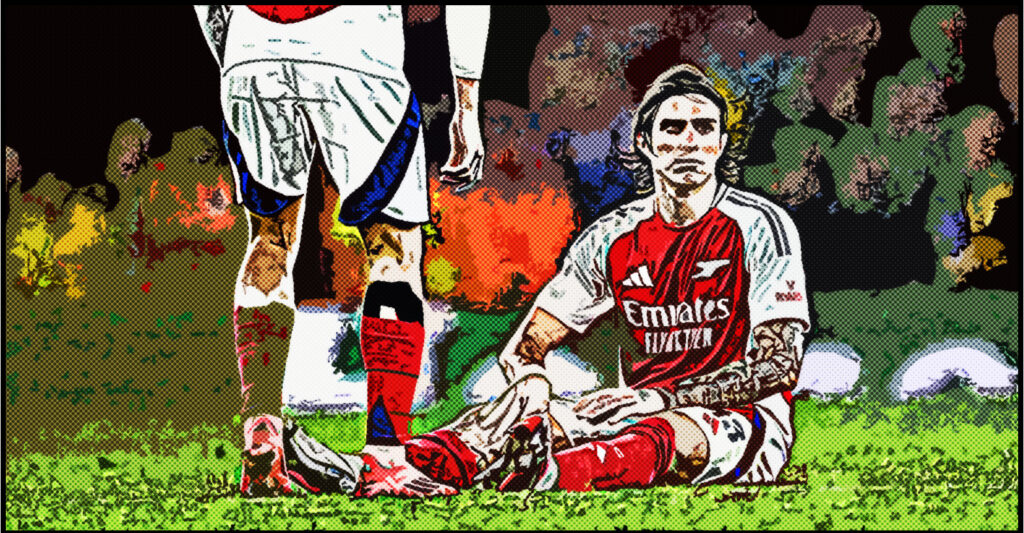Arsenal’s Champions League journey continues to offer lessons about the team’s evolving strengths and potential vulnerabilities. As Mikel Arteta adjusts his tactics to the demands of European football, there are several key takeaways from their latest outing. These include issues of creativity in the absence of key players, injury concerns among full-backs, and a growing debate over the revamped Champions League format. Here are three critical observations from the match.
Trossard’s Creativity: Not Quite Ødegaard, But He’s Trying
One of the most obvious takeaways from the game was Arsenal’s creative struggles without Martin Ødegaard. As the team’s midfield maestro, Ødegaard is pivotal in linking play and orchestrating attacks. His vision and ability to unlock defenses are essential to the team’s fluidity, and his absence left Arsenal searching for creativity.
Leandro Trossard was tasked with stepping into the creative role, and while he’s been a consistent and versatile player, he couldn’t replicate Ødegaard’s influence. Trossard thrives as a wide forward or finisher, but he lacks the deeper playmaking instincts that Ødegaard brings to the midfield. As a result, Arsenal’s attack became somewhat predictable, struggling to break down Atalanta’s organized defense.
While Arteta has other more proven options he could try in the midifield, another solution could be to give young Ethan Nwaneri more chances in the first team. Nwaneri has shown promise in Arsenal’s youth setup and during pre-season, where his creative abilities and maturity impressed many. With Ødegaard sidelined, it could be an opportunity for Arteta to integrate Nwaneri into the senior squad, providing a fresh spark in Arsenal’s midfield. This approach wouldn’t just help Arsenal cope with Ødegaard’s absence but also signal Arteta’s faith in the next generation of talent coming through the ranks.
Full-Backs: Tactical Geniuses or Walking Wounded?
Another issue that surfaced during the match was the growing injury list among Arsenal’s full-backs. Riccardo Calafiori’s knee injury in this game, following Jurrien Timber’s long-term absence, highlights a concerning trend. Arsenal’s system, which asks full-backs to contribute not only in defense but also in midfield as inverted full-backs, is physically demanding. Zinchenko and Tomiyasu, both versatile and essential to Arteta’s tactics, have also faced recurring injury problems.
This raises an important question: Are Arsenal’s full-backs being overworked? The demands placed on them in Arteta’s system require them to constantly transition between defending and contributing to the build-up in midfield. This requires exceptional fitness, tactical awareness, and the ability to cover significant ground, which might be contributing to the mounting injuries.
Looking for tactical alternatives could help manage this problem. One option would be to rotate full-backs more frequently, especially in less critical fixtures, to avoid overburdening key players. Arteta could also experiment with more traditional full-back roles, limiting their need to step into midfield, at least when managing a lead or playing against physically demanding opponents.
Interestingly, comparing Arsenal to other teams that employ similar tactics, like Manchester City, offers insight. Pep Guardiola’s City side also uses inverted full-backs but rotates heavily to ensure that no player is overstressed. Arsenal may need to follow a similar approach to preserve player fitness across the season, especially given their push on both domestic and European fronts. Additionally, the depth in Arsenal’s full-back position might need addressing, either through better squad management or further recruitment.
New Champions League Format: More Games, Less Drama?
Finally, the new Champions League format has changed the nature of the group stages, and not necessarily for the better. With more group-stage matches, the competition’s previous sense of urgency and drama has been reduced. Under the old system, every match felt critical with only six games to secure a place in the knockout rounds. Now, with additional fixtures, teams like Arsenal have more room to recover from early missteps.
This shift has diminished some of the high-stakes tension that made European nights so thrilling. Arsenal, for instance, can afford to play more cautiously in the group stages. But for the fans, this change risks taking away some of the excitement. Where every match once felt like a must-win, the new format provides more opportunities but also reduces the risk of early elimination, which could lead to more dead-rubber games as the group stage progresses.
While the expanded format does allow for more football and more commercial benefits, it arguably diminishes the competitive intensity. Teams may now approach early matches more conservatively, knowing that they have more time to secure qualification, which could make the group stages less thrilling for fans. This change has sparked debate across Europe, and the question remains whether UEFA might tweak the format again to reintroduce some of the jeopardy that made the Champions League so special.
Final Whistle
Arsenal’s Champions League performance raised several important points about the team’s current situation. The absence of Martin Ødegaard exposed the team’s creative reliance on their captain, while Leandro Trossard, though talented, couldn’t fill that role as effectively. Exploring alternatives like giving Ethan Nwaneri more playing time could provide a fresh approach to dealing with creative challenges in Ødegaard’s absence. Meanwhile, the growing injury list among full-backs like Calafiori and Timber has raised concerns about the physical demands placed on these players in Arteta’s tactical system. And finally, the revamped Champions League format, while offering more games, seems to have taken away some of the tension that made it the most exciting competition in football.
As Arsenal navigate their domestic and European campaigns, these are issues that Mikel Arteta will need to address. Whether through tactical adjustments, squad rotation, or giving opportunities to emerging talents like Nwaneri, Arsenal’s ability to manage these challenges will be key to their success this season.



